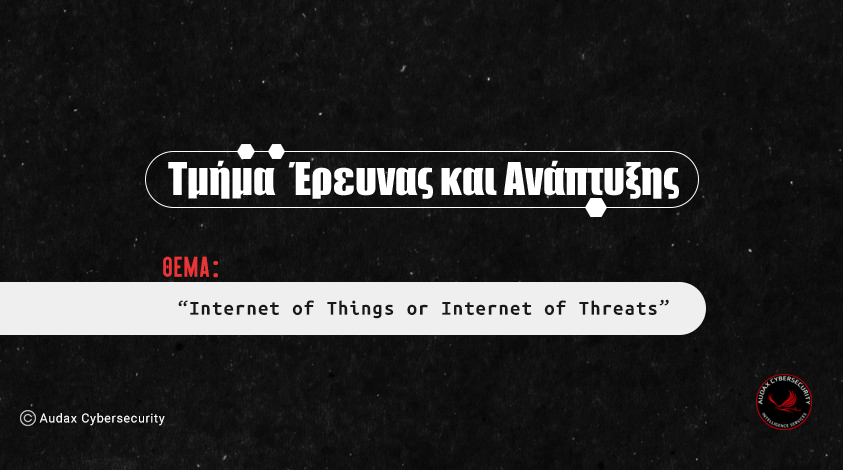Article by Mr.Kasimis Theofanis published in IT Security magazine.
Internet of Things or Internet of Threats???
The Internet of Things will soon become the largest vector of attacks on companies, as the number of connected devices is expected to reach between 20 billion and 50 billion units in 2020.
Gartner predicts that by 2020, more than 25% of attacks on businesses will involve the Internet of Things (IoT). However, expenses for IoT security are expected to reach $547 million in 2018, nearly double the previous year's $281.54 million, and this trend will continue. Experts estimate that risks will multiply each year, leading to a dramatic increase in security costs.
Gartner also believes that in the next few years, this kind of connectivity will be considered standard. This is clearly a disruptive event, which will lead to a complete overhaul of business. For example, CIOs will have to understand that the most competitive challenges - but also the biggest business opportunities - will come not only from the simple digitisation of a product or service, but also from the creation of a new business model.
There are several points that are not clear, including when some common operating standards will emerge, how well businesses and industry will adapt, and how they will apply all this to their business models.
Moreover, as great as the opportunities are, experience shows that the challenges will prove to be equally great, the most important being security. With so many billions of devices connected, how can anyone be sure that their data will remain secure? As we have seen in the past, a new technology must first reach a satisfactory level of security before it can be widely deployed. To understand this better, consider how long it has taken businesses to move to the cloud, and even now many of them are stalling.
Another open challenge is that of privacy and file sharing. This is a hot topic even in the present circumstances - imagine how much more controversy and concern will be raised whenever and when billions of devices are connected together. In addition, a large proportion of businesses will have to deal with another issue, that of the massive amount of data that all these devices will generate. In other words, businesses will have to find a way to store, locate, analyse and understand these huge amounts of data.
Any device, now or in the future, that has an online interface (beyond computers, tablets or "smart" mobiles) is part of the ever-expanding "internet of things". As clothes, homes, workplaces (offices and factories), private and public spaces in general become more and more 'smart', the 'internet of things' will expand and its digital territory will cover an ever larger area, making it an increasingly attractive target for hackers.
"If an object is connected to the internet, it can be found, and if it has an operating system, then it can be hacked," said Kevin Haley, director of cyber-security company Symantec Security, according to Agence France-Presse. "As we start bringing all these smart devices into our homes, we have to take some responsibility (for protecting them)," he added.
Among other technological "wonders" at the Las Vegas World Conference, Defcon, were baby clothes that record the baby's breathing and position (informing parents online), basketballs with built-in electronic sensors, from small toothbrushes to large "white" kitchen appliances that "talk" to the internet, as well as online vital medical devices (e.g. e.g. pacemakers), as well as the increasingly 'smart' cars now parked in garages.
All of the above could be hacked by malicious hackers, and there are hundreds of articles and videos on the Internet showing hacks on cars, coffee machines and more! "I don't think the 'bad guys' have yet realised the benefits to them of hacking such things," said Caitlin Cozoy, cyber-security officer at Bitdefender.
Of course, there is the other view, that of Google President and CEO Eric Schmidt, who was asked about the future of the Internet on a panel at the World Economic Forum in Davos, Switzerland, and replied "I will answer very simply that the Internet will disappear".
"There will be so many IP addresses, so many devices, so many sensors, things we'll be wearing, things we'll be interacting with that you won't even feel. It will be a part of your presence in time. Imagine walking into a room and the room is dynamic. And with your permission, you will be in an interactive relationship with whatever is happening in the room," Eric Schmidt said.
Google's President and CEO referred to the so-called "internet of things" in which internet-enabled devices, from phones to watches and from thermostats to light bulbs, are programmed to run themselves and be more efficient.
Eric Schmidt believes that our interactions with these devices will eventually be completely seamless.
In the panel entitled "The Future of the Digital Economy", Eric Schmidt also discussed Google's dominance in the search market and increased competition in the smartphone market, saying that "all bets are off" due to the new players in the market.
The President and CEO of Google was on the same panel as Facebook CEO Cheryl Sandberg, Microsoft CEO Satia Nadella, and Vodafone CEO Vittorio Colao.
The only certainty is that if the Internet does not disappear, it will spy on us! So believes Richard Stallman in a recent interview, who is the creator of the GNU Project, the Free Software Foundation and the Association for Programming Freedom, sounding the alarm about the US government's surveillance of Internet users' personal data collected by Internet companies and the so-called Internet of Things, which threatens to invade the homes of ordinary citizens under the guise of measuring the use of everyday products, objects and goods, such as electricity.
"Digital informants in citizens' homes" is what Stallman calls the new IoT trend.
Whether he is right or not, history will tell! What do you think?

